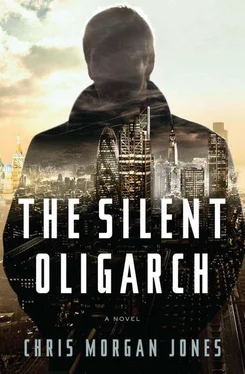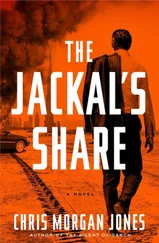“In Energy East Europe. Must have been summer ’99,” said Knight.
“No.” Come to that, how had his researchers missed it?
“Well read it. There wasn’t much of it but it caused a stir in my world.”
Webster nodded. He hated to feel foolish; particularly, he hated to be unprepared. “I will.”
“I don’t mean to open old wounds.”
“It’s fine.” He unclasped his watch, took it off his wrist and began to wind it. “I will.” He looked up at Knight. “Tell me about Faringdon.”
The look of incredulity hadn’t wholly left Knight’s face but he consciously changed mode and began. “It’s a vehicle. It buys things. Look at everything it owns. What we know it owns. Refineries in Bulgaria and Poland, new fields in Uzbekistan, producing fields in the Caspian and the Black Sea—Christ, PVC manufacturers in Turkey for God’s sake.” Knight was excited now, talking faster but no louder than before. “Upstream, downstream, midstream. It’s huge. It must be the biggest private energy consortium in the world, and I probably don’t know half of it. You definitely don’t. Your friend caught it when it was newborn, more or less. It’s been growing ever since. Now, what do you think it’s for?”
“A nest egg for Malin? Somewhere to put all that money he’s skimming.”
“That’s part of it, but no. It’s for winning back what Russia lost in 1989. It’s part of the new economic empire. Put Faringdon together with everything that the oil majors own, and Gazprom, and everything else, and you get Russia controlling half its neighbors’ energy industry—more even.”
“Frightening thought.”
“Isn’t it? It means they know everything that’s going on. And if the shit hits they own half the companies that matter.”
Webster sat and thought about it. He wasn’t sure any of this made sense.
“I can see some logic in it. What I don’t understand,” he said, “is why they’d bother. If there’s a real crisis they won’t be able to control what they own. And if they’re hiding the fact that they own it, it won’t make anyone more afraid of them.”
“It’s about influence, Ben. And having options. And they know they own it, which makes them feel clever. Which they are, of course.”
“And making money.”
“And making money.”
“What about Lock? Why involve him?”
“The dummy oligarch? Because someone has to own everything. Or be seen to.”
“But why him?”
“Why any of those people? There’s always one. I don’t think it matters who it is.”
Knight was right, thought Webster: this is less than useful to me, no matter how much of it is true. I need to expose Malin for corruption, not megalomania. Knight’s tea arrived. The first two fingers on his left hand were orange with nicotine. Usually by now, thought Webster, he’d have had at least one cigarette. He remembered him ranting inconsolably after Aeroflot finally banned smoking on all its flights.
“Do you know Grachev?” said Webster.
“Nikolai? Yes. He’s a stooge. And a spook. He’s an old FSB man. Not a trader at all. Unlike his predecessor.”
“Yes, what was that about? If what you say is right why would they let Gerstman leave?”
“That,” said Knight, “is an excellent question. I tried to interview him once, about a year before he went. Not very cooperative. Only a nipper, mind. He was different, more of a technocrat. Different breed, that—no oilman. He’d not have been out of place in a bank. A Western one at that.”
“Have you spoken to him since?”
“Since he left? No, no reason to. Too delicate. I hear he really did leave, though, didn’t just pretend. He’s in Berlin now, I think. God knows what he’s doing but word was he and Malin fell out.”
“Over what?”
“I’ve got no idea, Ben. None at all. Could be anything.”
That was better, at least.
Webster ran through in this head all the questions he might ask Knight and discarded most of them, partly because he didn’t want to reveal too much and partly because he could predict the answers. There was one, though.
“How secure is Malin? Politically?”
“That’s another good one.” Knight drank some tea. “As far as I know, rock solid. Well, solid as someone like him can be in Russia. I dare say Trotsky felt pretty comfortable at one point. Put it this way, I can’t imagine what would do for him.”
“Then why are you so nervous?” This was a more intimate question than Webster had ever asked him before, and he watched carefully for Knight’s reaction.
“That’s the bit I’d rather not discuss, if you don’t mind.”
“You can’t leave it at that.”
“I can, Ben, I can. Christ. You’ve got no idea, have you? None at all.” He took a last gulp of tea. “That’s all. That’s your lot.”
“Alan. Tell me this at least. Is it something that could hurt him?”
Knight sighed in frustration. “Christ, Ben.” A pause. “No, it isn’t. Quite the bloody reverse. Now that’s enough.”
Webster looked at him for a moment and saw that he meant it. “OK, Alan. Sorry. Thanks for saying as much as you have. I appreciate it.”
“Just promise me you won’t send me any more e-mails.”
“Promise. Are you sure you don’t want any money?”
“Quite sure, my lad. Quite sure. You can pay for my tea.”
Webster did, and they parted outside the café, Webster to walk back to Ikertu, Knight off in the sunshine to see his next client, stooped in his coat.
ON HIS RETURN, checking the urge to shout at his team, Webster shut himself away in his office and began to look for the article. He set about searching every database he knew, vast repositories of articles taken from the newspapers, magazines and unimaginably obscure trade journals of every country in the world. Most of Inessa’s writing was there—the straightforward early work, growing in commitment over time; the longer investigations for Novaya Gazeta; the handful of pieces in English—but he darted past it in fruitless pursuit of this one piece he half suspected did not exist, except, perhaps, in the increasingly fantastic mind of Alan Knight. He looked for Inessa’s name, for Faringdon, for Lock, for Malin. He tried every possible transliteration of her name and several outright misspellings. He searched in Roman text and Cyrillic. It simply wasn’t there.
Finally, desperate to find it and desperate not to, he researched Energy East Europe itself, a journal he only dimly knew. Its articles first appeared in March 2001 but stopped in April three years later, suggesting that it no longer existed. Some of its reporting had found its way on to the Internet, referenced or stolen by other sites, and there Webster found enough to explain why he hadn’t been able to find what he was looking for. The earliest pieces he saw had been published in 1998, which meant that for its first three years its output hadn’t found its way into any electronic file; quite simply, the databases had taken a while to pick it up.
EEE seemed to have been largely the work of one man. Half the articles had been written by Steve Elder, an American who now worked for a lobbying company in Washington. Webster thought he remembered him as one of the many journalists who had come to Moscow for a season or two and then left before it took full hold of them. His or not, the magazine had been published in London, and that, at least, was good news.
He found it after twenty minutes at the microfiche readers in Westminster Reference Library. He went himself because he wanted to be the one who read it first.
“Irish Company Buys Assets On Behalf of Russian State” was the title, halfway through the August edition. It was four pages, probably two thousand words, and there was the byline: “Inessa Kirova, Russia Correspondent.” Webster read it through three times, forcing himself to concentrate on the text and ignoring the voice that kept asking why he hadn’t known about this before.
Читать дальше












